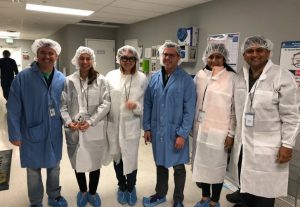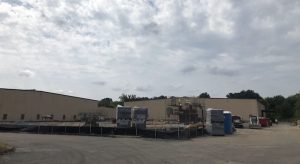With a state-mandated deadline approaching, the backers of one of the state’s first medical marijuana facilities are kicking construction into high gear.
Green Leaf Medical of Virginia, which last year was awarded a coveted license from the Virginia Board of Pharmacy to open one of only five medical cannabidiol processing operations statewide, expects to complete the first phase of its 82,000-square-foot complex at 2804 Decatur St. in the city’s Southside by year-end.
The company filed plans for the facility in March, then set out to raze two old tobacco warehouses onsite, before going vertical to meet the state’s requirement that it have a certificate of occupancy from the city by the end of 2019.
“We’re narrowing in. We expect to get our certificate of occupancy sometime in December,” said Green Leaf CEO Philip Goldberg, who’s leading the local effort alongside Virginia Pharmaceutical Processors, a group including Angel Papa, Ausrine Kuktelionyte and Sunita Gupta, who helped Green Leaf with the application, site selection and lining up contractors.

Philip Goldberg (left), with Angel Papa, Ausrine Kuktelionyte, Kevin Goldberg, Sunita Gupta, and her husband Sanjay Mittal.
The facility has grown in both size and cost since its initial announcement. It first was slated to be 50,000 square feet and cost $16 million. It’s now going to be 82,000 square feet and will cost $19.7 million, Goldberg said.
The facility is being built in two phases, both of which will include growing, extraction and selling CBD. Phase two is set to be completed in March 2020 and the decision to break it into phases was done to help the company get to market as quickly as possible, Goldberg said
“It’s not an easy feat to build 82,000 square feet in Manchester that quickly … We’ve done a lot to try to meet the deadlines,” he said. “We paid hundreds of thousands extra to expedite our steel and our masonry.”
KBS Inc. is the general contractor. Green Leaf is leasing the 2-acre parcel with an option to buy from local developer Fountainhead Properties. Goldberg said they plan to execute the purchase option in the next few months.
The state issued five licenses to cover each Health Service Area in the commonwealth, a process that drew 51 applicants. Green Leaf was awarded the license to grow, process and sell medical cannabis products in HSA IV, which covers Greater Richmond, the Piedmont and the areas south down to the North Carolina border.
Once operational, Green Leaf will focus on producing medical cannabis-based capsules, tinctures and vaporization products that will require a prescription in order to purchase.
“That’s what the law in Virginia allows for right now,” Goldberg said. “We can’t just produce flower; we have to produce concentrate products.”

The site of Green Leaf’s facility, taken from the same vantage point as the previous photo on Sept. 9.
The facility will open with a staff of about 100 and Green Leaf will plant seeds the day it gets into the building, Goldberg said. The facility eventually will be able to produce about 1,800 pounds of plants per month, from which about 215 pounds of oil can be extracted.
Goldberg said Green Leaf has been following the vaping crisis that’s risen in recent months as the safety of commercially available vape products has become unclear in light of a spike in related illnesses. He said he thinks the issues regarding cannabis vaping are arising from the illegal market, where there’s little oversight.
“The illegal market has to buy cannabis in order to extract the oil and make vaporization products. They can’t buy it from people like us who are held to extremely high standards, where there are inspections by the state and standard operating procedures that govern every move that every employee makes,” Goldberg said.
Green Leaf also operates in Pennsylvania, Ohio and Maryland, where it’s based.
Goldberg said many off-market cannabis vape products use pesticides and unsafe thinning agents during production, which have led to the health issues. He said Green Leaf isn’t in the recreational marijuana business and that the medical cannabis programs are easier to use than many recreational users might think.
“I’d just encourage people to take advantage of the medical cannabis program. It’s not hard to use and it’s a fairly quick process to get a recommendation from a physician,” he said.
With a state-mandated deadline approaching, the backers of one of the state’s first medical marijuana facilities are kicking construction into high gear.
Green Leaf Medical of Virginia, which last year was awarded a coveted license from the Virginia Board of Pharmacy to open one of only five medical cannabidiol processing operations statewide, expects to complete the first phase of its 82,000-square-foot complex at 2804 Decatur St. in the city’s Southside by year-end.
The company filed plans for the facility in March, then set out to raze two old tobacco warehouses onsite, before going vertical to meet the state’s requirement that it have a certificate of occupancy from the city by the end of 2019.
“We’re narrowing in. We expect to get our certificate of occupancy sometime in December,” said Green Leaf CEO Philip Goldberg, who’s leading the local effort alongside Virginia Pharmaceutical Processors, a group including Angel Papa, Ausrine Kuktelionyte and Sunita Gupta, who helped Green Leaf with the application, site selection and lining up contractors.

Philip Goldberg (left), with Angel Papa, Ausrine Kuktelionyte, Kevin Goldberg, Sunita Gupta, and her husband Sanjay Mittal.
The facility has grown in both size and cost since its initial announcement. It first was slated to be 50,000 square feet and cost $16 million. It’s now going to be 82,000 square feet and will cost $19.7 million, Goldberg said.
The facility is being built in two phases, both of which will include growing, extraction and selling CBD. Phase two is set to be completed in March 2020 and the decision to break it into phases was done to help the company get to market as quickly as possible, Goldberg said
“It’s not an easy feat to build 82,000 square feet in Manchester that quickly … We’ve done a lot to try to meet the deadlines,” he said. “We paid hundreds of thousands extra to expedite our steel and our masonry.”
KBS Inc. is the general contractor. Green Leaf is leasing the 2-acre parcel with an option to buy from local developer Fountainhead Properties. Goldberg said they plan to execute the purchase option in the next few months.
The state issued five licenses to cover each Health Service Area in the commonwealth, a process that drew 51 applicants. Green Leaf was awarded the license to grow, process and sell medical cannabis products in HSA IV, which covers Greater Richmond, the Piedmont and the areas south down to the North Carolina border.
Once operational, Green Leaf will focus on producing medical cannabis-based capsules, tinctures and vaporization products that will require a prescription in order to purchase.
“That’s what the law in Virginia allows for right now,” Goldberg said. “We can’t just produce flower; we have to produce concentrate products.”

The site of Green Leaf’s facility, taken from the same vantage point as the previous photo on Sept. 9.
The facility will open with a staff of about 100 and Green Leaf will plant seeds the day it gets into the building, Goldberg said. The facility eventually will be able to produce about 1,800 pounds of plants per month, from which about 215 pounds of oil can be extracted.
Goldberg said Green Leaf has been following the vaping crisis that’s risen in recent months as the safety of commercially available vape products has become unclear in light of a spike in related illnesses. He said he thinks the issues regarding cannabis vaping are arising from the illegal market, where there’s little oversight.
“The illegal market has to buy cannabis in order to extract the oil and make vaporization products. They can’t buy it from people like us who are held to extremely high standards, where there are inspections by the state and standard operating procedures that govern every move that every employee makes,” Goldberg said.
Green Leaf also operates in Pennsylvania, Ohio and Maryland, where it’s based.
Goldberg said many off-market cannabis vape products use pesticides and unsafe thinning agents during production, which have led to the health issues. He said Green Leaf isn’t in the recreational marijuana business and that the medical cannabis programs are easier to use than many recreational users might think.
“I’d just encourage people to take advantage of the medical cannabis program. It’s not hard to use and it’s a fairly quick process to get a recommendation from a physician,” he said.




I thought the facility was required by law to be up and running by now, or at least by the end of 2019. Now they’re talking about March 2020?